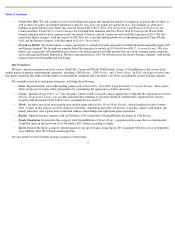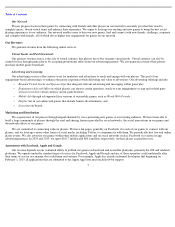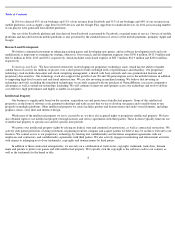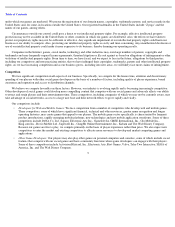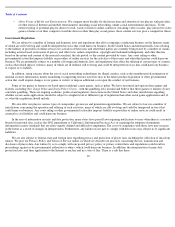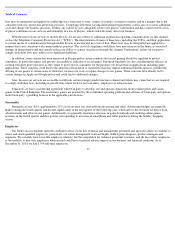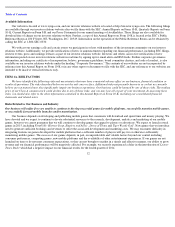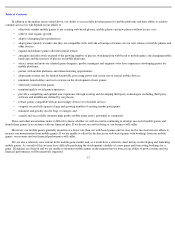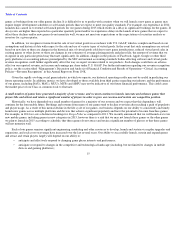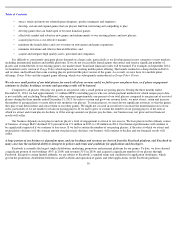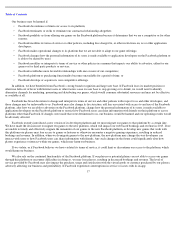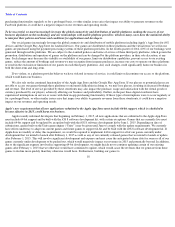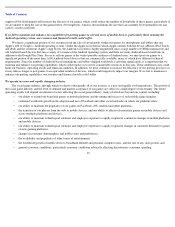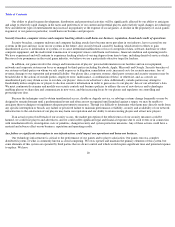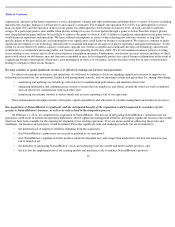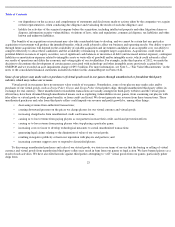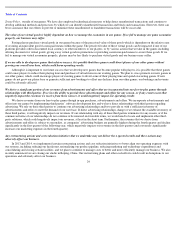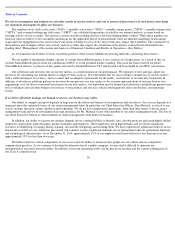Zynga 2014 Annual Report Download - page 19
Download and view the complete annual report
Please find page 19 of the 2014 Zynga annual report below. You can navigate through the pages in the report by either clicking on the pages listed below, or by using the keyword search tool below to find specific information within the annual report.
Table of Contents
It is difficult to consistently anticipate player demand on a large scale, particularly as we develop games in new categories or new markets,
including international markets and mobile platforms. If we do not successfully launch games that attract and retain a significant number of
players and extend the life of our existing games, our market share, brand and financial results will be harmed. For example, in September 2014,
we launched a new version of Zynga Poker which replaced our existing mobile poker offering. The launch resulted in a sharp decline in DAUs
and revenue, and feedback that some existing players preferred the prior version of the game. As a result, we now have two mobile poker
offerings, Zynga Poker and the original game offering, which was subsequently reintroduced as Zynga Poker Classic .
We rely on a small portion of our total players for nearly all of our revenue and if we fail to grow our player base, or if player engagement
continues to decline, bookings, revenue and operating results will be harmed.
Compared to all players who play our games in any period, only a small portion are paying players. During the three months ended
December 31, 2014, we had approximately 1.1 million MUPs (excluding payers who use certain payment methods for which unique payer data
is not available and excluding NaturalMotion), who represent approximately one percent of our total players compared to one percent of our total
players during the three months ended December 31, 2013. In order to sustain and grow our revenue levels, we must attract, retain and increase
the number of paying players or more effectively monetize our players. To retain players, we must devote significant resources so that the games
they play retain their interest and attract them to our other games. We might not succeed in our efforts to increase the monetization rates of our
users, particularly if we are unable to retain our paying players. If we fail to grow or sustain the number of our paying players, if the rates at
which we attract and retain players declines or if the average amount our players pay declines, our business may not grow and our financial
results will suffer.
Our business depends on our players and our player’s level of engagement is critical to our success. We lose players in the ordinary course
of business. Average MAU declined 31% percent from 171 million in 2013 to 118 million in 2014. Our financial performance will continue to
be significantly impacted if we continue to lose users. If we fail to sustain the number of our paying players, if the rates at which we attract and
retain players declines or if the average amount our players pay declines, our business will continue to decline and our financial results will
suffer.
A large portion of our business is dependent upon, and our bookings and revenues are derived from the Facebook platform, and Facebook in
many cases has the unilateral ability to interpret its policies and terms and conditions for applications and developers.
Facebook is currently the largest single distribution, marketing, promotion and payment platform for our games. To date, we have derived
a significant portion of our bookings (43% in 2014) and revenue (51% in 2014) and acquired a significant number of our players through
Facebook. Except for certain limited addenda, we are subject to Facebook’s standard terms and conditions for application developers, which
govern the promotion, distribution between us and Facebook and operation of games and other applications on the Facebook platform.
16
•
attract, retain and motivate talented game designers, product managers and engineers;
•
develop, sustain and expand games that our players find fun, interesting and compelling to play;
•
develop games that can build upon or become franchise games;
•
effectively market and advertise new games and enhancements to our existing players and new players;
•
acquire players in a cost
-
effective manner;
•
minimize the launch delays and cost overruns on new games and game expansions;
•
minimize downtime and other technical difficulties; and
•
acquire and integrate high quality assets, personnel and companies.


